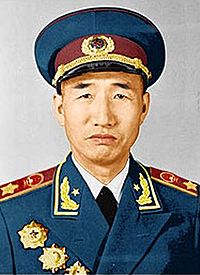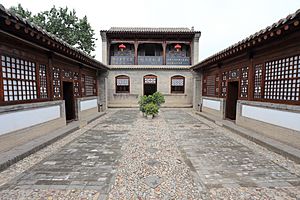Xu Xiangqian facts for kids
Quick facts for kids
Xu Xiangqian
|
|
|---|---|
|
徐向前
|
|

Marshal Xu Xianqian
|
|
| 4th Minister of National Defense | |
| In office March 1978 – March 1981 |
|
| Preceded by | Ye Jianying |
| Succeeded by | Geng Biao |
| Personal details | |
| Born | November 8, 1901 Wutai County, Shanxi |
| Died | September 21, 1990 (aged 88) Beijing |
| Awards | |
| Military service | |
| Allegiance | |
| Branch/service | |
| Years of service | 1924–1987 |
| Rank | Marshal of People's Republic of China |
| Commands |
|
| Battles/wars |
|
Xu Xiangqian (born November 8, 1901 – died September 21, 1990) was an important military leader in China. He was one of the ten top military leaders, known as Ten Marshals, of the People's Liberation Army.
Xu came from a wealthy family. However, he chose to join the National Revolutionary Army in 1924, even though his parents did not agree. Later, when the Kuomintang (Nationalist Party) started fighting the Communists in 1927, Xu left the Nationalist forces. He then led a Communist army in Sichuan province.
After a period of political changes in the early 1930s, Xu continued his military career. He joined the Chinese Red Army under the leadership of Mao Zedong. He held a less senior role at first.
During the Second Sino-Japanese War (1937-1945), Xu worked in different military groups. He helped build important military bases in northern China. When the Chinese Civil War started again in 1947, Xu was very active. His forces captured the strong city of Taiyuan in 1949, which was a big victory.
After the People's Republic of China was formed in 1949, Xu was honored as one of China's "Ten Marshals." He held many important jobs in the government and military. He even survived the difficult Cultural Revolution, trying to make its effects less harmful. He strongly supported Deng Xiaoping's return to power in 1976. Xu continued to serve until he retired in 1985.
Contents
Biography of Xu Xiangqian
Early Military Career and Training
Xu Xiangqian was born in Wutai County, Shanxi province. His father was a wealthy landowner and a scholar. Xu went to Taiyuan Normal College and finished his studies in 1923.
After college, he worked briefly as a school teacher. Then, against his parents' wishes, he joined the first class of the Whampoa Military Academy in 1924. This academy was very important for training military leaders.
From 1925 to 1927, Xu held various officer positions in the National Revolutionary Army. In 1926, he took part in the Northern Expedition. This was a campaign led by Chiang Kai-shek to unite China by defeating various warlords.
After the campaign, Xu moved to Wuchang. There, he taught at a military academy. While teaching, he joined the Communist Party of China.
Joining the Communist Forces
In 1927, the alliance between the Nationalists and Communists ended. Xu went into hiding. He did not join the Nanchang Uprising, which failed. However, he led the Guangzhou Uprising shortly after, which also failed.
Xu did not work with Mao Zedong at first. Instead, he became a main military commander for another Communist leader, Zhang Guotao. The army Xu commanded was called the "4th Front Army." He was Zhang's main commander, with Ye Jianying as his Chief of Staff.
During this time, Xu helped Zhang build new Communist bases. He also expanded the 4th Front Army of the Chinese Red Army. Xu led the 80,000-strong 4th Front Army in Sichuan. They won against local warlord troops that had more than 300,000 soldiers. Over 100,000 warlord troops were killed. The rest either left or moved to other Nationalist areas.
In 1934, Chiang Kai-shek defeated the armies of Zhou Enlai and Mao Zedong. This forced them to begin the Long March. Zhang Guotao thought about attacking them, but Xu refused. Xu's refusal to attack Zhang's rivals might have helped Mao accept Xu later.
Zhang's 4th Front Army was eventually defeated by Chiang. Zhang was later removed from power after returning to areas controlled by Mao. However, Xu was allowed to rejoin the Red Army under Mao's leadership. He had to make a detailed self-criticism. His first job under Mao was deputy commander of the 129th division, which was a lower rank than before.
World War II and Civil War
During the Second Sino-Japanese War (1937-1945), Xu moved to several different positions. He spent some time with Luo Ronghuan building bases in Communist areas of Shandong. Then, he moved to He Long's United Defense Army as deputy commander.
The Communist bases Xu helped build became very useful after World War II ended in 1945. When the Chinese Civil War started again, the Communist headquarters in Shaanxi had to move. They moved to the bases that Xu had helped establish.
During the Chinese Civil War, Xu fought in several battles in North China. Unlike many Communist commanders who waited to attack with much larger forces, Xu often fought against equally strong or even stronger enemies and won. In 1948 and 1949, Xu defeated the forces of Yan Xishan. Yan was a warlord from Shanxi who supported the Kuomintang.
Xu Xiangqian's Political Roles
Joining the New Government
After the Communists won the Civil War in 1949, Xu became the General Chief of Staff of the People's Liberation Army. In 1954, he was named the vice chairman of the Central Military Commission.
In 1955, he was named one of the "Ten Marshals" of China. In 1965, he became one of China's vice premiers.
Challenges and Return to Power
In 1967, Xu faced difficulties during the Cultural Revolution. He was accused of not supporting Lin Biao's leadership. He also tried to make some of the Cultural Revolution's extreme actions less harsh. Despite these challenges, he survived politically. Later that year, he was allowed to join both the Politburo and the Cultural Revolution Group. In 1969, he joined the Central Committee.
Xu helped protect Deng Xiaoping when Deng was removed from the government in 1976. Later in 1976, Xu was one of the military leaders who supported Hua Guofeng's actions against the Gang of Four. This event eventually brought Deng back to power and officially ended the Cultural Revolution.
Defense Minister and Later Years
From 1978 to 1981, Xu served as the Defense Minister. He believed that the People's Liberation Army should be a well-trained and well-equipped military force. He also supported using military technology from other countries. This was a new idea compared to earlier policies.
In 1978, Xu was almost hurt during a demonstration of a Chinese missile. The missile suddenly turned around and flew back towards the observation platform where Xu and other top officers were sitting. Luckily, the missile did not explode, and everyone was safe. Xu had not planned to attend, but he went because other leaders were sick.
Xu led the preparations for China's military actions in the Sino-Vietnamese War in 1979.
After stepping down as Defense Minister in 1981, Xu remained active in politics. He served in the Politburo and the Central Committee. He was also the vice chairman of the Central Military Commission. In 1985, he had to retire from his positions, along with Nie Rongzhen and Ye Jianying.
Xu Xiangqian passed away in 1990. His official obituary praised his life as "glorious." It described him as an outstanding Communist, a great revolutionary, a strategist, and one of the founders of the Chinese People's Liberation Army.
 | Claudette Colvin |
 | Myrlie Evers-Williams |
 | Alberta Odell Jones |


